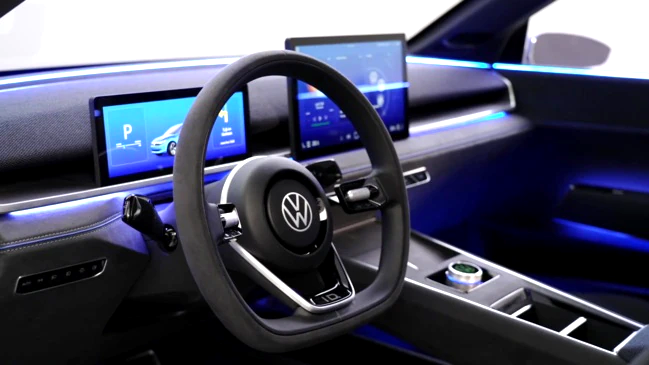The Low-Cost Electric Vehicle (EV) that Volkswagen is negotiating to create with Renault is priced at €20,000 ($21,476). According to the sources, the negotiations are aimed at establishing a framework that will facilitate the increase in accessibility of battery-powered autos.
It is still unclear what will come out of the conversations with Renault because they are still in the preliminary stage. However, according to Reuters, which cited a report from Handelsblatt, both corporations are aiming for an ambitious yearly output range of 200,000 to 250,000 automobiles if the collaboration happens to be successful.
Volkswagen has decided not to give any remarks regarding the discussions that have been published. In response, a spokeswoman for Renault emphasized the need of working together in order to keep up with the competition in the market for electric vehicles with small entry levels. In spite of the fact that ongoing negotiations have been acknowledged, the spokesperson noted that no definitive agreements have been made.
During the International Motor Show IAA, which took place in Munich, southern Germany, on September 6, 2023, a customized self-driving ID Buzz vehicle manufactured by Volkswagen, a German automobile manufacturer, was presented in the booth of Mobileye, a system software company that is developing autonomous driving technology, among other things.
Keeping Up with The Competition
Automakers in Europe, such as Volkswagen and Renault, are working to make electric vehicles more accessible to consumers. This strategic decision was made in the midst of rising competition from Tesla and cheaper models manufactured in China.
In the first half of 2023, the average retail price of an electric vehicle (EV) in Europe surpassed €65,000 ($69,835), as reported by JATO Dynamics, a business that specializes in automotive research. The number is significant when compared to China, where electric vehicles (EVs) averaged slightly more than €31,000 ($33,305).
With the intention of democratizing the market for electric vehicles, Renault recently introduced its new electric vehicle, the Twingo Legend, which has a price tag of less than €20,000 ($21,493). The information regarding Volkswagen’s development of an all-electric vehicle was leaked in March. The vehicle is expected to be priced at €25,000 ($26,866) and will be released in 2025. The automobile manufacturer also dropped hints that they are working on an electric vehicle that will cost €20,000 ($21,493), but they did not disclose any further specifics.
On the other hand, Volkswagen CEO Oliver Blume stated a month ago that the manufacture of the Volkswagen electric vehicle that costs €20,000 had not yet been agreed upon.
Read Also: The Promising Scope of IoT in Pakistan: A Technological Revolution 2023
Volkswagen has reportedly formed a partnership with Magna Steyr to develop its Scout electric vehicle (EV) brand in Europe, receiving an order worth 450 million euros ($492 million). This news comes after a rumor that Volkswagen had secured the partnership.
Magna Steyr, which has its headquarters in Graz, Austria, is rumored to be the company that will be in charge of developing the two prototypes of the Volkswagen Scout electric vehicle, which are an electric pickup and an SUV. It is anticipated that the autos will make their debut in the United States at the beginning of 2027, and that series production would be completed in 2026. The electric vehicles will be manufactured by Volkswagen in its factory in South Carolina, rather than by Magna.
Number of EV Users in Germany Slide
According to a research published by Clean Technical in November, the percentage of Germans who drove plug-in electric vehicles (EVs) dropped from 39.4% the previous year to 25.7%. 18.3 percent of vehicles were fully electric, while 7.4 percent were plug-in hybrids. The decline in the electric vehicle market in the country can be linked to the modifications in incentives and regulatory revisions that have taken place.
It is planned that electric vehicles in Germany will be subject to yet another drop in incentives beginning January 1, 2024. In addition, the eligibility price ceiling for electric vehicle incentives will be reduced from €65,000 ($69,867) to €45,000 ($48,370), and the bonus amount will decrease from €4,500 ($4,835) to €3,000 ($3,223) after the reduction.
It is projected that this change will result in a pull-forward impact throughout the month of December, followed by a subsequent fall in January, particularly for electric vehicle models priced between €45,000 and €65,000. There is still a lack of clarity regarding how this change will combine with the residual impacts of the incentive cut that occurred in September.
Conclusion:
At the end of the day, the negotiations that Volkswagen and Renault have been having about a low-cost electric vehicle represent a strategic move within the automobile sector. Establishing a shared commitment to the advancement of environmentally responsible transportation solutions is suggested by the exploration of partnership in the creation of inexpensive electric automobiles. In the event that this arrangement is successful, it has the ability to democratize electric mobility by making it more accessible to a wider range of consumers. However, the specifics of these discussions and the results of those discussions will definitely have a significant impact on the future of both firms as well as the electric car market as a whole. Both industry stakeholders and hobbyists will be keeping a close eye on any new advances that make their way into the market.




